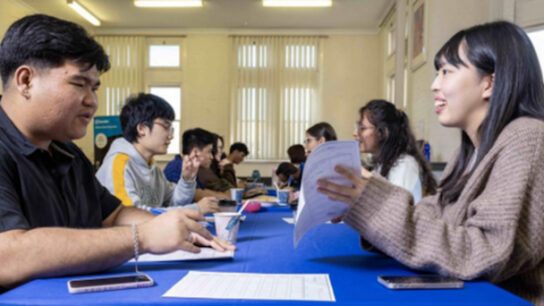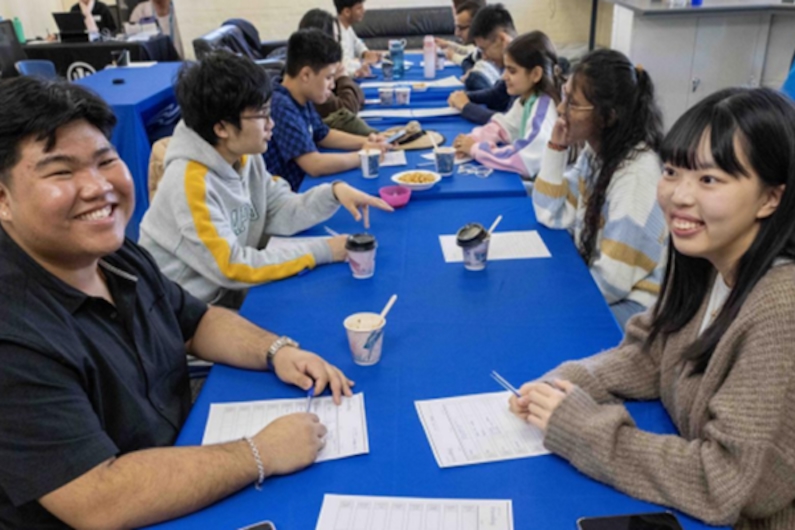
SAIBT’s focus on student wellbeing finds solution to combatting loneliness
In today’s fast-paced, digitally-driven world, loneliness has become a growing concern, particularly among younger generations.
Gen Z and millennials are now considered some of the loneliest age groups in Australia. Recognising this, the South Australian Institute of Business and Technology (SAIBT) has taken innovative steps to address the issue by hosting speed-friending events— an initiative designed to help students connect, form friendships, and ultimately feel more at home in Adelaide.
Titled, ‘Inside the rise of speed-friending in Adelaide as Gen Z hit back at loneliness epidemic’, SAIBT’s success has been highlighted in Adelaide’s news publication, SA Life.
Understanding the challenge
The rise in social media use and the lingering effects of the COVID-19 pandemic have left many young people feeling more isolated than ever. Studies show that young Australians aged 15-34 are among the most vulnerable to loneliness, which can lead to serious mental and physical health consequences. SAIBT, known for its commitment to student wellbeing, identified this pressing issue within its community and sought to create a solution that would foster genuine human connection.
With the creation of a Wellbeing Team and the positive impact this has had in driving student wellbeing initiatives on campus, attendance at events is now regularly selling out.
Caroline Burrowes, SAIBT Student Experience Co-ordinator, has staged three friending meets over the past year.
“It’s a way to help them make friends, meet people and get outside of their bedrooms, which can be really challenging for this generation,” Caroline said. “It actually makes a difference.”
The success of speed-friending
SAIBT’s speed-friending events offer students a structured yet relaxed environment where they can meet and converse with peers over short, timed sessions. The events are particularly beneficial for international students and those new to Adelaide, who may find it challenging to build a social network in a new city.
Jaesen Pich, a student who arrived in Adelaide from Cambodia in 2013, is one of many who have benefited from these events. Initially struggling to make friends, Jaesen found that speed-friending helped him break the ice and form lasting connections. Today, he not only has a close-knit group of friends but also volunteers to help organize these events, ensuring that others don’t have to experience the same loneliness he once felt.

“It’s amazing. Everyone who came most definitely went away with a new friend,” Jaesen said. “I made connections with four new friends this time – one of them wanted to invite me out for a Korean dinner, so that’s what we’re organising.”
SAIBT’s wellbeing strategy
Apart from speed-friending, SAIBT has implemented a student experience strategy as a critical component of their broader Wellbeing Strategy. This aims to front-load events and activities in the first 6 weeks of trimester when students are most at risk of loneliness in the hope that they make connections to see them through the rest of their studies.
Student ambassadors also play an important role in driving student success, designing and delivering engaging on campus activities. The college has seen great improvements with the implementation of Social Club, a fortnightly event planned, organised and run by students for students; the Peer Support Mentor Program, a buddy program which matches up experienced students with new students in their first 6 weeks to provide adjustment support; and the Student Events Committee, which is responsible for planning and organising one major on campus event per trimester.
Committing to student wellbeing, SAIBT received its Skilled Workforce recognition from Mental Health First Aid Australia in December 2022 and are on track to apply for the next level of recognition Tier 2 Advanced Workplace. They are one of 254 organisations with workplace recognition of this level.
A model for other institutions
By prioritising student wellbeing, creating opportunities for in-person interaction, and fostering an inclusive environment, colleges can play a pivotal role in combating loneliness among students. The positive feedback and growing participation in SAIBT’s speed-friending events underscore the importance of such initiatives in promoting mental health and social connectedness. According to the 2022 Australian Government QILT Student Experience Survey, SAIBT achieved an 84.4% satisfaction rate for student support, ranking the college 20th out of the 125 participating institutions surveyed. SAIBT also ranked in the top 10 of the 83 participating institutions with 200+ responses. This result was well above the NUHEI Average (79.5%), University Average (72.1%) and National Average (72.7%).
As SAIBT continues to lead the way in supporting student wellbeing, the speed-friending initiative stands out as a shining example of how thoughtful, community-focused activities can make a significant difference in the lives of students, helping them not just survive, but truly thrive in their new academic environments.